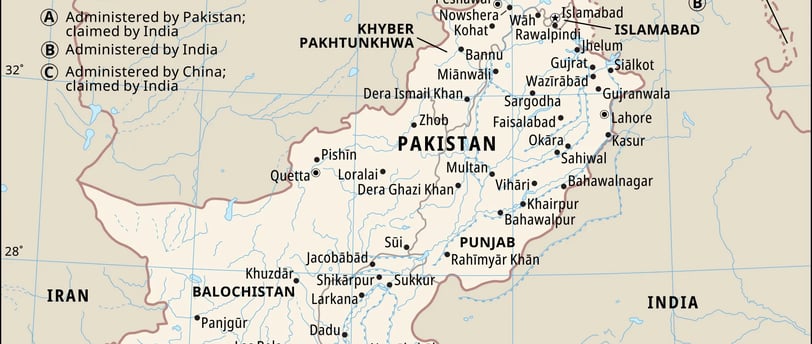The Birth of Pakistan and Its Geo-Strategic Importance
The creation of Pakistan in 1947 stands as one of the most significant turning points in South Asian history. National emergence in Pakistan developed beyond typical straightforward timelines because religious beliefs, political conflicts, economic issues, and strategic interests boiled over for decades. The Muslim League, led by Muhammad Ali Jinnah, functioned as the essential entity advocating for a unique Muslim territory because its members feared becoming sidelined from power in Hindu-dominated India.
Aniket Chakraborty, 3rd year BA LLB
5/1/20253 min read


The political movement reached its peak through the Indian subcontinent partition that created Pakistan as a territory intended to give Muslims across the region safe protection. Following the 1940 Lahore Resolution, Muslims decided to push for separate independent states as a formal demand. British colonial administration and rising religious conflict acted together to speed up the division of the Indian subcontinent. British "divide and rule" strategies contributed to rising Hindu-Muslim tensions, which made the concept of peaceful existence permanently unworkable. The hastily departing British Raj, alongside insufficient planning, created what became one of the biggest human migration catastrophes, along with widespread violence and persistent animosity throughout history.
The destiny of Pakistan emerged from its geographical nature since its inception. As an independent state that cut across two wings through more than 1000 miles (West and East Pakistan before 1971), the new country needed to overcome distinct problems in maintaining open communication and establishing governance, along with integrating various parts of the nation. The land possessed promising strategic value but suffered economically because it had received minimal industrial infrastructure from British colonial rule. The strategic geographical position of Pakistan delivered both promising prospects together with dangerous situations. The country's crucial strategic position developed from its position between India, China, Iran and Afghanistan, together with its proximity to vital maritime routes of the Arabian Sea on the world stage. The outstanding geographical position of Pakistan brings immense strategic significance to the nation. The nation holds crucial significance in world energy matters because of its strategic position near the Middle Eastern oil reserves. Pakistan holds a strategic position between three vital geographic regions, which makes the country a lucrative hub for intercontinental trade exchanges and diplomatic networking, and energy projects.
The gateway concept of Pakistan to Central Asia has become stronger through the China-Pakistan Economic Corridor (CPEC) along with other modern initiatives.
The same geolocation that granted advantages to Pakistan exposed it to multiple hazards. Since its emergence, Pakistan has maintained a military posture due to the difficult relationship with India, primarily concerning the Kashmir resolution. The continuous pressure between these two countries generated three major wars starting in 1947-48 that altered both Pakistan's military framework and national political landscape. Pakistan faced complicated challenges from being sandwiched between Afghanistan, since it ended up defending against the Soviet expansionist efforts during the Cold War. The security situation in Pakistan remains influenced by the events from the 1980s that brought large numbers of Afghan refugees and led to weapon proliferation despite reductions in Cold War tensions and the emergence of militant organisations in the region. The Arabian Sea coastline of Pakistan continues to represent a lasting strategic character advantage for the country. The creation of ports, including Karachi and new port developments at Gwadar, established Pakistan as an important maritime power in the nearby areas. Gwadar stands out as a major international attraction because it serves as a connection point for China's Belt and Road Initiative (BRI), which gives Pakistan fresh importance in worldwide logistics alongside energy transport and trade routes. The development of Gwadar port holds promise to convert Pakistan into a central economic zone for the region, yet security issues and governance matters still block this path.
The strategic location of Pakistan creates both beneficial and costly effects for the country. The advantages of geo-strategic position include economic assistance and military alliances, and international awareness, but these advantages force Pakistan into battles and covert warfare. Excessive external alliances have forced Pakistan to sacrifice some of its governmental independence. During the Cold War period, Pakistan received strategic advantages from its US and eventually Chinese alliances at the cost of developing new international dependencies, together with resulting weak points. The American alliance during the War on Terror after 9/11 enabled major financial assistance, yet triggered extreme internal social instability by promoting domestic terrorism. Pakistan conducts strategic decision-making based on security considerations that exist against India. Theory of "strategic depth" in Afghanistan and atomic weapons development and support to non-state groups serve Pakistan to fight against Indian regional leadership. The implementation of these strategic approaches ended up causing Pakistan to experience increased international estrangement as well as financial troubles.
In conclusion, the foundation of Pakistan emerges beyond the basic perspective of a new nation creation and resulted from various strong political tides alongside religious movements, along with British colonial heritage and strategic requirements. From its beginning, Pakistan has existed with two sides of its geographic destiny: one as its primary benefit and the other as its most severe roadblock. Pakistan's ability to turn its geographic location into economic success, along with regional alliances and diplomatic clout, depends on its capacity to stay away from destructive conflicts remains a fundamental decision-point for its development. The upcoming decades will require Pakistan to prove its capability of converting its geo-strategic position into continuous development, together with regional stabilisation.
Footnotes:
Kamath, P.M., India-Pakistan Relations: Courting Peace from the Corridors of War, Promilla & Co. Publishers.
Singh, Nagendra, Defence Mechanism of the Modern State, Asia Publishing House.
Jalal, Ayesha. The Sole Spokesman: Jinnah, the Muslim League, and the Demand for Pakistan. Cambridge University Press.
Cohen, Stephen P., The Idea of Pakistan, Brookings Institution Press.
Because Every Legal Mind Deserves a Great Conversation.
Legaltea.in@gmail.com
+91 6284295492
MSME Certified
© 2025 Legal Tea. All rights reserved.


